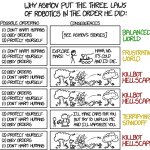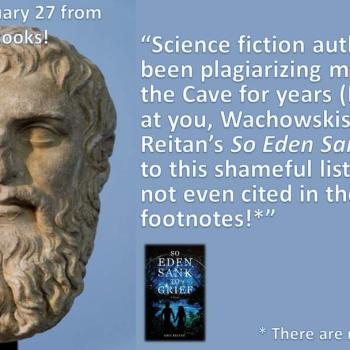I was fascinated by the recent New York Times article, “Inside the World of Racist Science Fiction.” Here’s an excerpt:
It is unlikely that Mr. Trump has read any of these books. But members of his staff undoubtedly have. His former aide Steve Bannon is a fan of “The Camp of the Saints” and refers to it often — in knowing, offhand ways that betray both his familiarity with racist literature and his awareness of his target audience’s reading habits. Another administration official, Julie Kirchner, was named ombudsman at the Customs and Border Protection after spending 10 years as the executive director of the Federation for American Immigration Reform. That organization, which Southern Poverty Law Center has designated a hate group, was founded by John Tanton, who runs The Social Contract Press, which is the current publisher of “The Camp of the Saints.”
The point is not that there is a direct line between, say, “The Turner Diaries” and the Oval Office. Rather, it’s that the tropes that define the Trump administration’s rhetoric and policies — apocalyptic xenophobia, anti-Semitic conspiracies, racist fear-mongering — are also the tropes that define white-supremacist literature. To the hundreds of thousands of fans of Mr. Kendall, Ms. Williams and other writers, Mr. Trump must seem like a character out of racist central casting: a rule-breaking white knight who will stop at nothing to root out the conspiracies and take on their race’s enemies. No wonder the bond between Mr. Trump and the far right is so strong: Not only is he a hero out of their novels, but in supporting him, they have become heroes themselves.
Fiction can influence us in countless ways, and science fiction in particular serves to warn about the future and predict alternatives, whether good or evil. And whether they’re good or evil is in the eye of the reader. I’ve blogged before about science fiction as prophecy. Prophets did not just guess about a future world – their words and actions helped bring it into being. False prophets did likewise. These prophets of false gods are arguably more dangerous than the spokespeople of Ba’al were felt to be by religious reformers and revolutionaries in ancient Israel such as Elijah, Hosea, and Jeremiah…
Also about science fiction that fails to be inclusive, there was an interesting article recently about the fact that most science fiction fails to depict its spacecrafts and time machines as wheelchair accessible. If we don’t imagine accessibility as part of our future, what does it say about us?
There was also an article in The Guardian a couple of years ago about how to avoid taking our racism with us into space. See too an article by Ronnie Faulkner about racial integration in Edgar Rice Burroughs’ stories set on Mars.

















